Contemporary Issues in International Business
VerifiedAdded on 2022/12/05
|12
|4139
|490
AI Summary
This report discusses the important contemporary issues faced by organizations in international business, such as international company structure, foreign laws and regulations, political risk, currency rates, and cultural differences. It also explores the global context in which international businesses function in the 21st century, methods to enter foreign markets, reasons for internationalization, and alternative theories of internationalization. Additionally, it examines the impact of multinationals on both home and host nations.
Contribute Materials
Your contribution can guide someone’s learning journey. Share your
documents today.
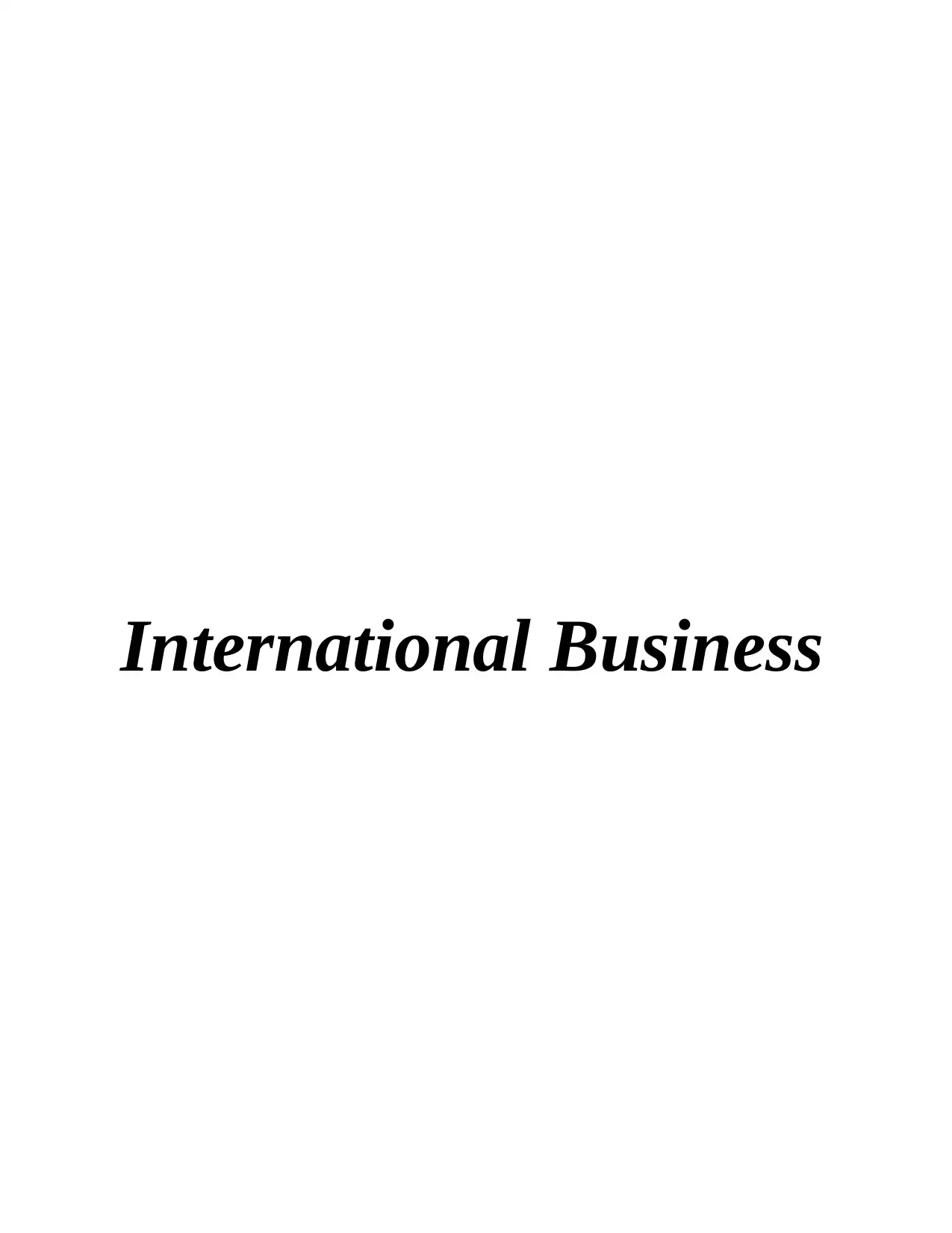
International Business
Secure Best Marks with AI Grader
Need help grading? Try our AI Grader for instant feedback on your assignments.
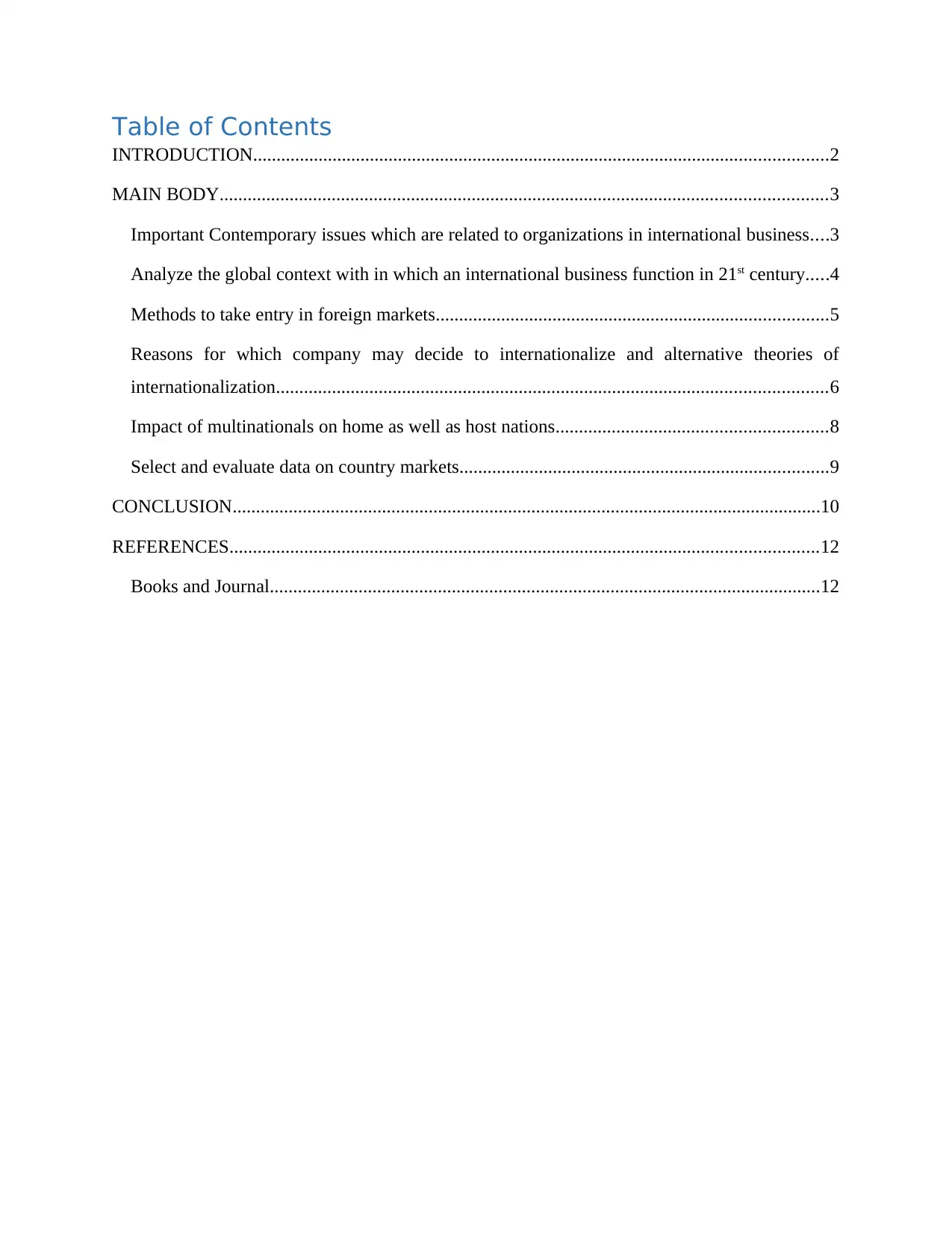
Table of Contents
INTRODUCTION...........................................................................................................................2
MAIN BODY..................................................................................................................................3
Important Contemporary issues which are related to organizations in international business....3
Analyze the global context with in which an international business function in 21st century.....4
Methods to take entry in foreign markets....................................................................................5
Reasons for which company may decide to internationalize and alternative theories of
internationalization......................................................................................................................6
Impact of multinationals on home as well as host nations..........................................................8
Select and evaluate data on country markets...............................................................................9
CONCLUSION..............................................................................................................................10
REFERENCES..............................................................................................................................12
Books and Journal......................................................................................................................12
INTRODUCTION...........................................................................................................................2
MAIN BODY..................................................................................................................................3
Important Contemporary issues which are related to organizations in international business....3
Analyze the global context with in which an international business function in 21st century.....4
Methods to take entry in foreign markets....................................................................................5
Reasons for which company may decide to internationalize and alternative theories of
internationalization......................................................................................................................6
Impact of multinationals on home as well as host nations..........................................................8
Select and evaluate data on country markets...............................................................................9
CONCLUSION..............................................................................................................................10
REFERENCES..............................................................................................................................12
Books and Journal......................................................................................................................12
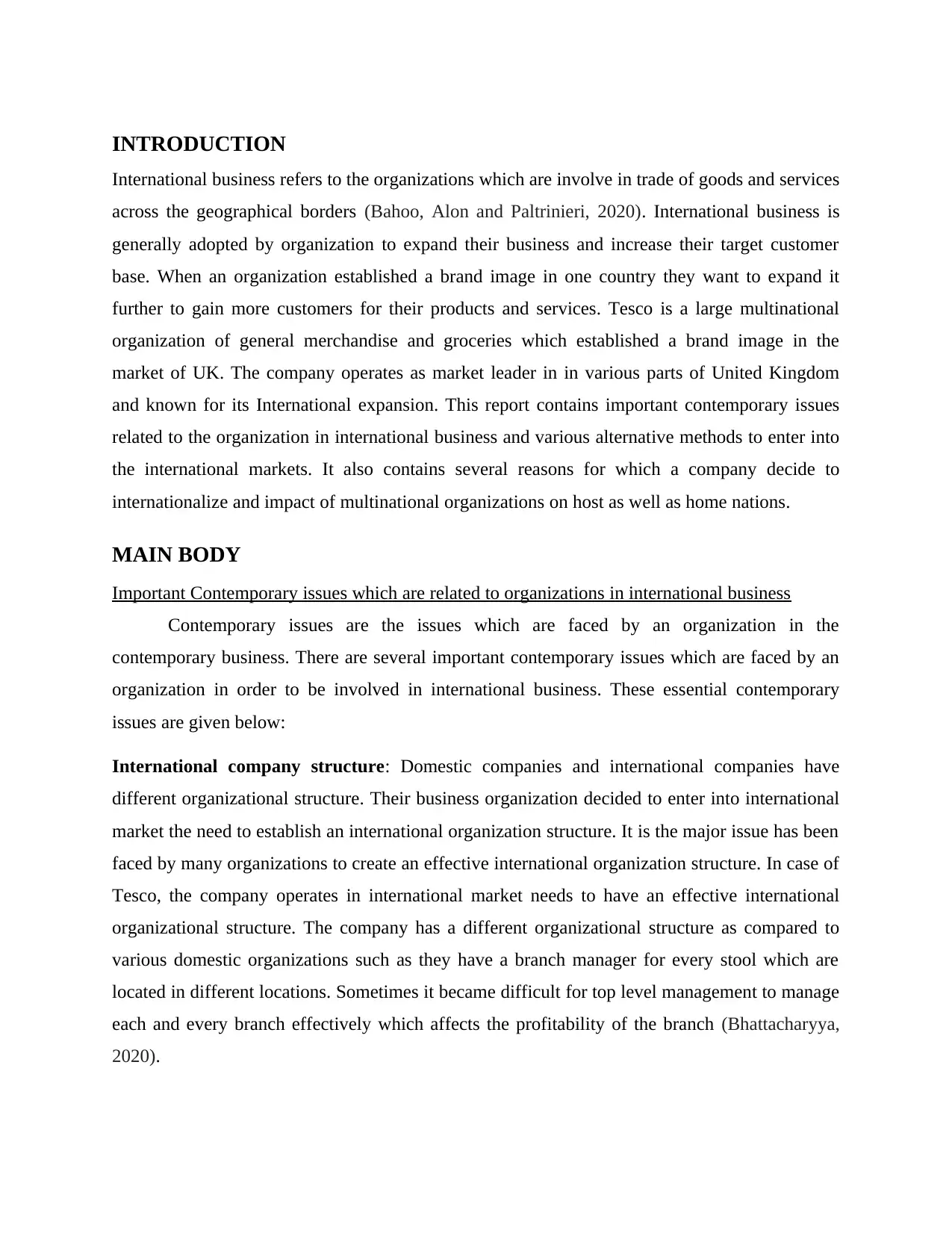
INTRODUCTION
International business refers to the organizations which are involve in trade of goods and services
across the geographical borders (Bahoo, Alon and Paltrinieri, 2020). International business is
generally adopted by organization to expand their business and increase their target customer
base. When an organization established a brand image in one country they want to expand it
further to gain more customers for their products and services. Tesco is a large multinational
organization of general merchandise and groceries which established a brand image in the
market of UK. The company operates as market leader in in various parts of United Kingdom
and known for its International expansion. This report contains important contemporary issues
related to the organization in international business and various alternative methods to enter into
the international markets. It also contains several reasons for which a company decide to
internationalize and impact of multinational organizations on host as well as home nations.
MAIN BODY
Important Contemporary issues which are related to organizations in international business
Contemporary issues are the issues which are faced by an organization in the
contemporary business. There are several important contemporary issues which are faced by an
organization in order to be involved in international business. These essential contemporary
issues are given below:
International company structure: Domestic companies and international companies have
different organizational structure. Their business organization decided to enter into international
market the need to establish an international organization structure. It is the major issue has been
faced by many organizations to create an effective international organization structure. In case of
Tesco, the company operates in international market needs to have an effective international
organizational structure. The company has a different organizational structure as compared to
various domestic organizations such as they have a branch manager for every stool which are
located in different locations. Sometimes it became difficult for top level management to manage
each and every branch effectively which affects the profitability of the branch (Bhattacharyya,
2020).
International business refers to the organizations which are involve in trade of goods and services
across the geographical borders (Bahoo, Alon and Paltrinieri, 2020). International business is
generally adopted by organization to expand their business and increase their target customer
base. When an organization established a brand image in one country they want to expand it
further to gain more customers for their products and services. Tesco is a large multinational
organization of general merchandise and groceries which established a brand image in the
market of UK. The company operates as market leader in in various parts of United Kingdom
and known for its International expansion. This report contains important contemporary issues
related to the organization in international business and various alternative methods to enter into
the international markets. It also contains several reasons for which a company decide to
internationalize and impact of multinational organizations on host as well as home nations.
MAIN BODY
Important Contemporary issues which are related to organizations in international business
Contemporary issues are the issues which are faced by an organization in the
contemporary business. There are several important contemporary issues which are faced by an
organization in order to be involved in international business. These essential contemporary
issues are given below:
International company structure: Domestic companies and international companies have
different organizational structure. Their business organization decided to enter into international
market the need to establish an international organization structure. It is the major issue has been
faced by many organizations to create an effective international organization structure. In case of
Tesco, the company operates in international market needs to have an effective international
organizational structure. The company has a different organizational structure as compared to
various domestic organizations such as they have a branch manager for every stool which are
located in different locations. Sometimes it became difficult for top level management to manage
each and every branch effectively which affects the profitability of the branch (Bhattacharyya,
2020).
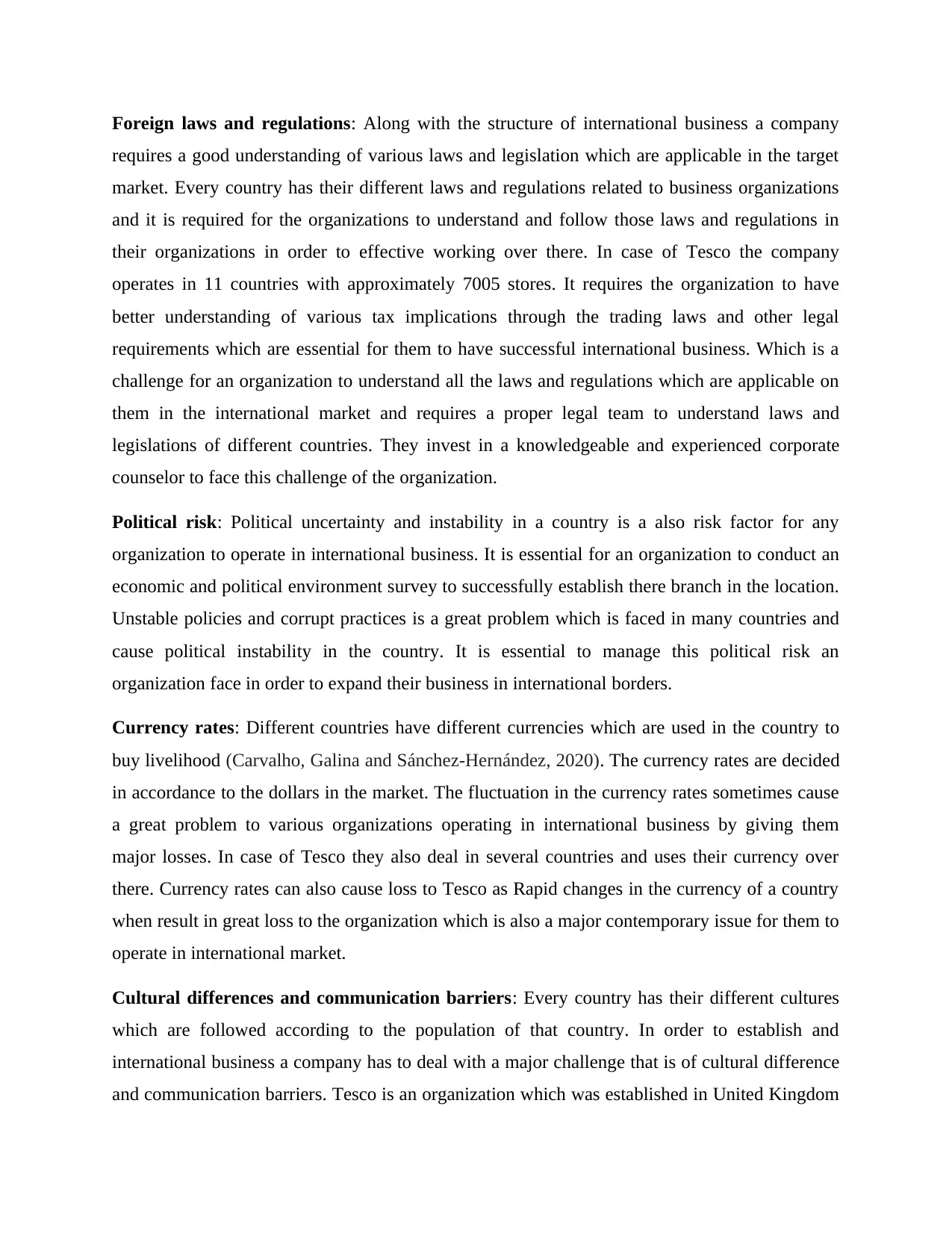
Foreign laws and regulations: Along with the structure of international business a company
requires a good understanding of various laws and legislation which are applicable in the target
market. Every country has their different laws and regulations related to business organizations
and it is required for the organizations to understand and follow those laws and regulations in
their organizations in order to effective working over there. In case of Tesco the company
operates in 11 countries with approximately 7005 stores. It requires the organization to have
better understanding of various tax implications through the trading laws and other legal
requirements which are essential for them to have successful international business. Which is a
challenge for an organization to understand all the laws and regulations which are applicable on
them in the international market and requires a proper legal team to understand laws and
legislations of different countries. They invest in a knowledgeable and experienced corporate
counselor to face this challenge of the organization.
Political risk: Political uncertainty and instability in a country is a also risk factor for any
organization to operate in international business. It is essential for an organization to conduct an
economic and political environment survey to successfully establish there branch in the location.
Unstable policies and corrupt practices is a great problem which is faced in many countries and
cause political instability in the country. It is essential to manage this political risk an
organization face in order to expand their business in international borders.
Currency rates: Different countries have different currencies which are used in the country to
buy livelihood (Carvalho, Galina and Sánchez‐Hernández, 2020). The currency rates are decided
in accordance to the dollars in the market. The fluctuation in the currency rates sometimes cause
a great problem to various organizations operating in international business by giving them
major losses. In case of Tesco they also deal in several countries and uses their currency over
there. Currency rates can also cause loss to Tesco as Rapid changes in the currency of a country
when result in great loss to the organization which is also a major contemporary issue for them to
operate in international market.
Cultural differences and communication barriers: Every country has their different cultures
which are followed according to the population of that country. In order to establish and
international business a company has to deal with a major challenge that is of cultural difference
and communication barriers. Tesco is an organization which was established in United Kingdom
requires a good understanding of various laws and legislation which are applicable in the target
market. Every country has their different laws and regulations related to business organizations
and it is required for the organizations to understand and follow those laws and regulations in
their organizations in order to effective working over there. In case of Tesco the company
operates in 11 countries with approximately 7005 stores. It requires the organization to have
better understanding of various tax implications through the trading laws and other legal
requirements which are essential for them to have successful international business. Which is a
challenge for an organization to understand all the laws and regulations which are applicable on
them in the international market and requires a proper legal team to understand laws and
legislations of different countries. They invest in a knowledgeable and experienced corporate
counselor to face this challenge of the organization.
Political risk: Political uncertainty and instability in a country is a also risk factor for any
organization to operate in international business. It is essential for an organization to conduct an
economic and political environment survey to successfully establish there branch in the location.
Unstable policies and corrupt practices is a great problem which is faced in many countries and
cause political instability in the country. It is essential to manage this political risk an
organization face in order to expand their business in international borders.
Currency rates: Different countries have different currencies which are used in the country to
buy livelihood (Carvalho, Galina and Sánchez‐Hernández, 2020). The currency rates are decided
in accordance to the dollars in the market. The fluctuation in the currency rates sometimes cause
a great problem to various organizations operating in international business by giving them
major losses. In case of Tesco they also deal in several countries and uses their currency over
there. Currency rates can also cause loss to Tesco as Rapid changes in the currency of a country
when result in great loss to the organization which is also a major contemporary issue for them to
operate in international market.
Cultural differences and communication barriers: Every country has their different cultures
which are followed according to the population of that country. In order to establish and
international business a company has to deal with a major challenge that is of cultural difference
and communication barriers. Tesco is an organization which was established in United Kingdom
Secure Best Marks with AI Grader
Need help grading? Try our AI Grader for instant feedback on your assignments.
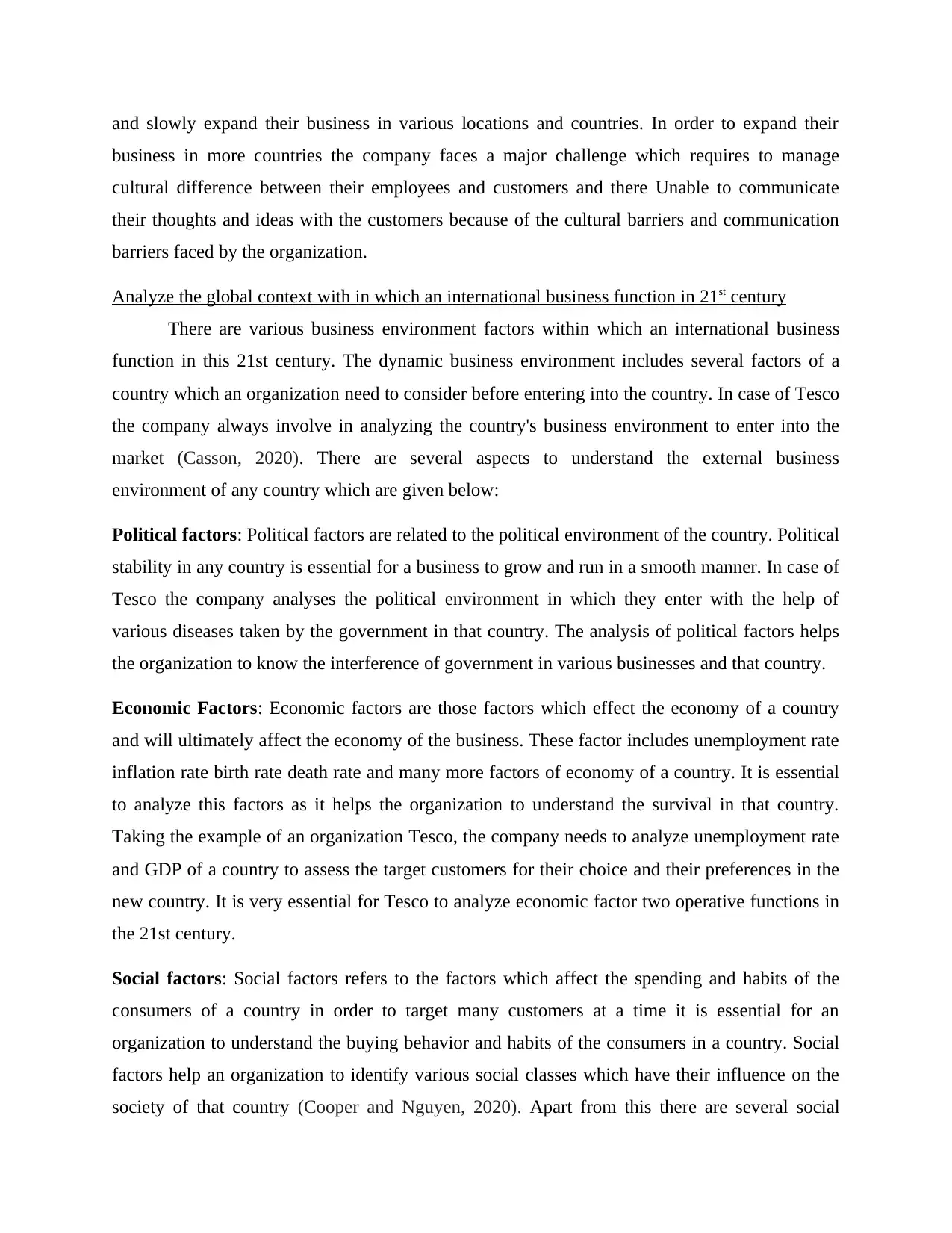
and slowly expand their business in various locations and countries. In order to expand their
business in more countries the company faces a major challenge which requires to manage
cultural difference between their employees and customers and there Unable to communicate
their thoughts and ideas with the customers because of the cultural barriers and communication
barriers faced by the organization.
Analyze the global context with in which an international business function in 21st century
There are various business environment factors within which an international business
function in this 21st century. The dynamic business environment includes several factors of a
country which an organization need to consider before entering into the country. In case of Tesco
the company always involve in analyzing the country's business environment to enter into the
market (Casson, 2020). There are several aspects to understand the external business
environment of any country which are given below:
Political factors: Political factors are related to the political environment of the country. Political
stability in any country is essential for a business to grow and run in a smooth manner. In case of
Tesco the company analyses the political environment in which they enter with the help of
various diseases taken by the government in that country. The analysis of political factors helps
the organization to know the interference of government in various businesses and that country.
Economic Factors: Economic factors are those factors which effect the economy of a country
and will ultimately affect the economy of the business. These factor includes unemployment rate
inflation rate birth rate death rate and many more factors of economy of a country. It is essential
to analyze this factors as it helps the organization to understand the survival in that country.
Taking the example of an organization Tesco, the company needs to analyze unemployment rate
and GDP of a country to assess the target customers for their choice and their preferences in the
new country. It is very essential for Tesco to analyze economic factor two operative functions in
the 21st century.
Social factors: Social factors refers to the factors which affect the spending and habits of the
consumers of a country in order to target many customers at a time it is essential for an
organization to understand the buying behavior and habits of the consumers in a country. Social
factors help an organization to identify various social classes which have their influence on the
society of that country (Cooper and Nguyen, 2020). Apart from this there are several social
business in more countries the company faces a major challenge which requires to manage
cultural difference between their employees and customers and there Unable to communicate
their thoughts and ideas with the customers because of the cultural barriers and communication
barriers faced by the organization.
Analyze the global context with in which an international business function in 21st century
There are various business environment factors within which an international business
function in this 21st century. The dynamic business environment includes several factors of a
country which an organization need to consider before entering into the country. In case of Tesco
the company always involve in analyzing the country's business environment to enter into the
market (Casson, 2020). There are several aspects to understand the external business
environment of any country which are given below:
Political factors: Political factors are related to the political environment of the country. Political
stability in any country is essential for a business to grow and run in a smooth manner. In case of
Tesco the company analyses the political environment in which they enter with the help of
various diseases taken by the government in that country. The analysis of political factors helps
the organization to know the interference of government in various businesses and that country.
Economic Factors: Economic factors are those factors which effect the economy of a country
and will ultimately affect the economy of the business. These factor includes unemployment rate
inflation rate birth rate death rate and many more factors of economy of a country. It is essential
to analyze this factors as it helps the organization to understand the survival in that country.
Taking the example of an organization Tesco, the company needs to analyze unemployment rate
and GDP of a country to assess the target customers for their choice and their preferences in the
new country. It is very essential for Tesco to analyze economic factor two operative functions in
the 21st century.
Social factors: Social factors refers to the factors which affect the spending and habits of the
consumers of a country in order to target many customers at a time it is essential for an
organization to understand the buying behavior and habits of the consumers in a country. Social
factors help an organization to identify various social classes which have their influence on the
society of that country (Cooper and Nguyen, 2020). Apart from this there are several social
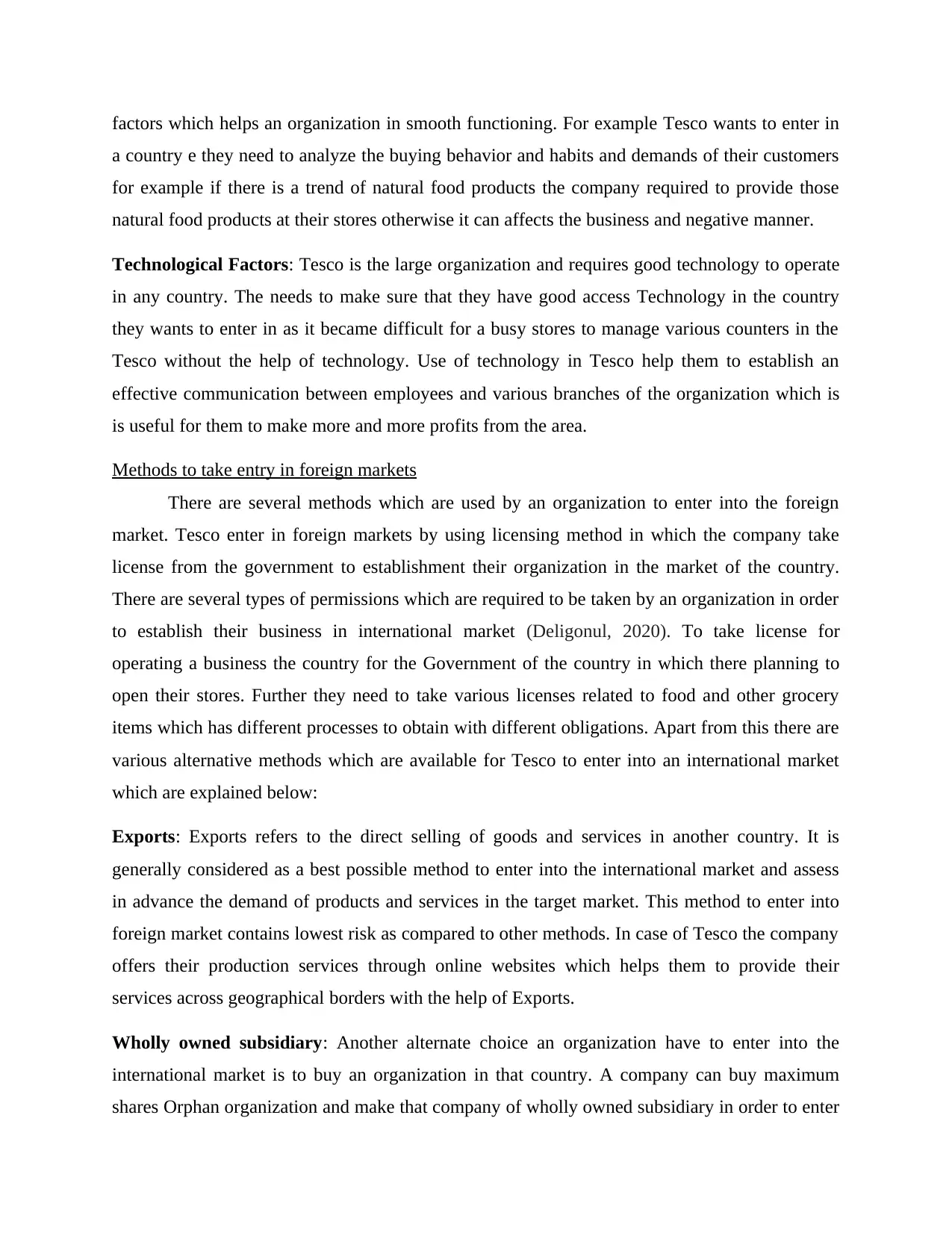
factors which helps an organization in smooth functioning. For example Tesco wants to enter in
a country e they need to analyze the buying behavior and habits and demands of their customers
for example if there is a trend of natural food products the company required to provide those
natural food products at their stores otherwise it can affects the business and negative manner.
Technological Factors: Tesco is the large organization and requires good technology to operate
in any country. The needs to make sure that they have good access Technology in the country
they wants to enter in as it became difficult for a busy stores to manage various counters in the
Tesco without the help of technology. Use of technology in Tesco help them to establish an
effective communication between employees and various branches of the organization which is
is useful for them to make more and more profits from the area.
Methods to take entry in foreign markets
There are several methods which are used by an organization to enter into the foreign
market. Tesco enter in foreign markets by using licensing method in which the company take
license from the government to establishment their organization in the market of the country.
There are several types of permissions which are required to be taken by an organization in order
to establish their business in international market (Deligonul, 2020). To take license for
operating a business the country for the Government of the country in which there planning to
open their stores. Further they need to take various licenses related to food and other grocery
items which has different processes to obtain with different obligations. Apart from this there are
various alternative methods which are available for Tesco to enter into an international market
which are explained below:
Exports: Exports refers to the direct selling of goods and services in another country. It is
generally considered as a best possible method to enter into the international market and assess
in advance the demand of products and services in the target market. This method to enter into
foreign market contains lowest risk as compared to other methods. In case of Tesco the company
offers their production services through online websites which helps them to provide their
services across geographical borders with the help of Exports.
Wholly owned subsidiary: Another alternate choice an organization have to enter into the
international market is to buy an organization in that country. A company can buy maximum
shares Orphan organization and make that company of wholly owned subsidiary in order to enter
a country e they need to analyze the buying behavior and habits and demands of their customers
for example if there is a trend of natural food products the company required to provide those
natural food products at their stores otherwise it can affects the business and negative manner.
Technological Factors: Tesco is the large organization and requires good technology to operate
in any country. The needs to make sure that they have good access Technology in the country
they wants to enter in as it became difficult for a busy stores to manage various counters in the
Tesco without the help of technology. Use of technology in Tesco help them to establish an
effective communication between employees and various branches of the organization which is
is useful for them to make more and more profits from the area.
Methods to take entry in foreign markets
There are several methods which are used by an organization to enter into the foreign
market. Tesco enter in foreign markets by using licensing method in which the company take
license from the government to establishment their organization in the market of the country.
There are several types of permissions which are required to be taken by an organization in order
to establish their business in international market (Deligonul, 2020). To take license for
operating a business the country for the Government of the country in which there planning to
open their stores. Further they need to take various licenses related to food and other grocery
items which has different processes to obtain with different obligations. Apart from this there are
various alternative methods which are available for Tesco to enter into an international market
which are explained below:
Exports: Exports refers to the direct selling of goods and services in another country. It is
generally considered as a best possible method to enter into the international market and assess
in advance the demand of products and services in the target market. This method to enter into
foreign market contains lowest risk as compared to other methods. In case of Tesco the company
offers their production services through online websites which helps them to provide their
services across geographical borders with the help of Exports.
Wholly owned subsidiary: Another alternate choice an organization have to enter into the
international market is to buy an organization in that country. A company can buy maximum
shares Orphan organization and make that company of wholly owned subsidiary in order to enter
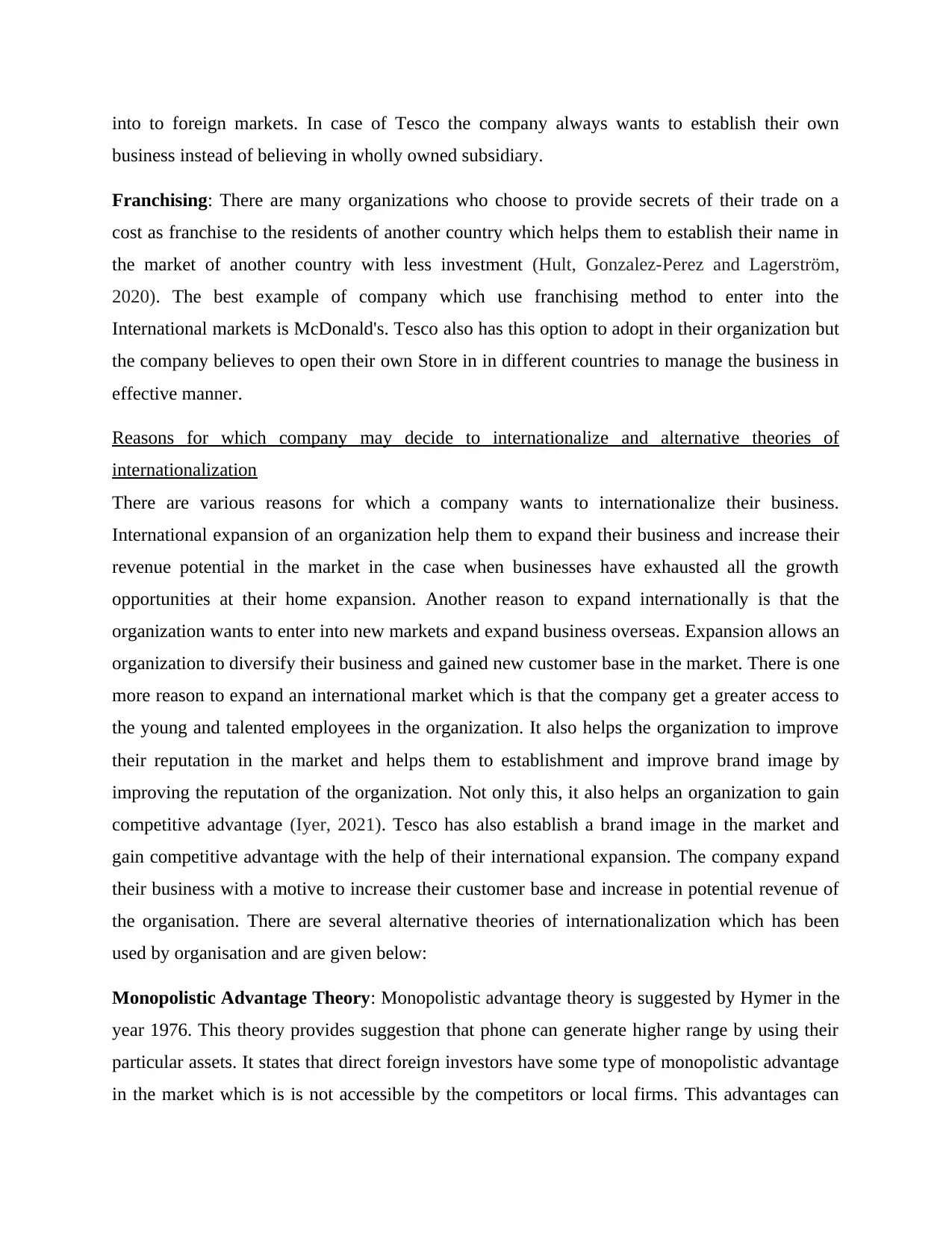
into to foreign markets. In case of Tesco the company always wants to establish their own
business instead of believing in wholly owned subsidiary.
Franchising: There are many organizations who choose to provide secrets of their trade on a
cost as franchise to the residents of another country which helps them to establish their name in
the market of another country with less investment (Hult, Gonzalez-Perez and Lagerström,
2020). The best example of company which use franchising method to enter into the
International markets is McDonald's. Tesco also has this option to adopt in their organization but
the company believes to open their own Store in in different countries to manage the business in
effective manner.
Reasons for which company may decide to internationalize and alternative theories of
internationalization
There are various reasons for which a company wants to internationalize their business.
International expansion of an organization help them to expand their business and increase their
revenue potential in the market in the case when businesses have exhausted all the growth
opportunities at their home expansion. Another reason to expand internationally is that the
organization wants to enter into new markets and expand business overseas. Expansion allows an
organization to diversify their business and gained new customer base in the market. There is one
more reason to expand an international market which is that the company get a greater access to
the young and talented employees in the organization. It also helps the organization to improve
their reputation in the market and helps them to establishment and improve brand image by
improving the reputation of the organization. Not only this, it also helps an organization to gain
competitive advantage (Iyer, 2021). Tesco has also establish a brand image in the market and
gain competitive advantage with the help of their international expansion. The company expand
their business with a motive to increase their customer base and increase in potential revenue of
the organisation. There are several alternative theories of internationalization which has been
used by organisation and are given below:
Monopolistic Advantage Theory: Monopolistic advantage theory is suggested by Hymer in the
year 1976. This theory provides suggestion that phone can generate higher range by using their
particular assets. It states that direct foreign investors have some type of monopolistic advantage
in the market which is is not accessible by the competitors or local firms. This advantages can
business instead of believing in wholly owned subsidiary.
Franchising: There are many organizations who choose to provide secrets of their trade on a
cost as franchise to the residents of another country which helps them to establish their name in
the market of another country with less investment (Hult, Gonzalez-Perez and Lagerström,
2020). The best example of company which use franchising method to enter into the
International markets is McDonald's. Tesco also has this option to adopt in their organization but
the company believes to open their own Store in in different countries to manage the business in
effective manner.
Reasons for which company may decide to internationalize and alternative theories of
internationalization
There are various reasons for which a company wants to internationalize their business.
International expansion of an organization help them to expand their business and increase their
revenue potential in the market in the case when businesses have exhausted all the growth
opportunities at their home expansion. Another reason to expand internationally is that the
organization wants to enter into new markets and expand business overseas. Expansion allows an
organization to diversify their business and gained new customer base in the market. There is one
more reason to expand an international market which is that the company get a greater access to
the young and talented employees in the organization. It also helps the organization to improve
their reputation in the market and helps them to establishment and improve brand image by
improving the reputation of the organization. Not only this, it also helps an organization to gain
competitive advantage (Iyer, 2021). Tesco has also establish a brand image in the market and
gain competitive advantage with the help of their international expansion. The company expand
their business with a motive to increase their customer base and increase in potential revenue of
the organisation. There are several alternative theories of internationalization which has been
used by organisation and are given below:
Monopolistic Advantage Theory: Monopolistic advantage theory is suggested by Hymer in the
year 1976. This theory provides suggestion that phone can generate higher range by using their
particular assets. It states that direct foreign investors have some type of monopolistic advantage
in the market which is is not accessible by the competitors or local firms. This advantages can
Paraphrase This Document
Need a fresh take? Get an instant paraphrase of this document with our AI Paraphraser
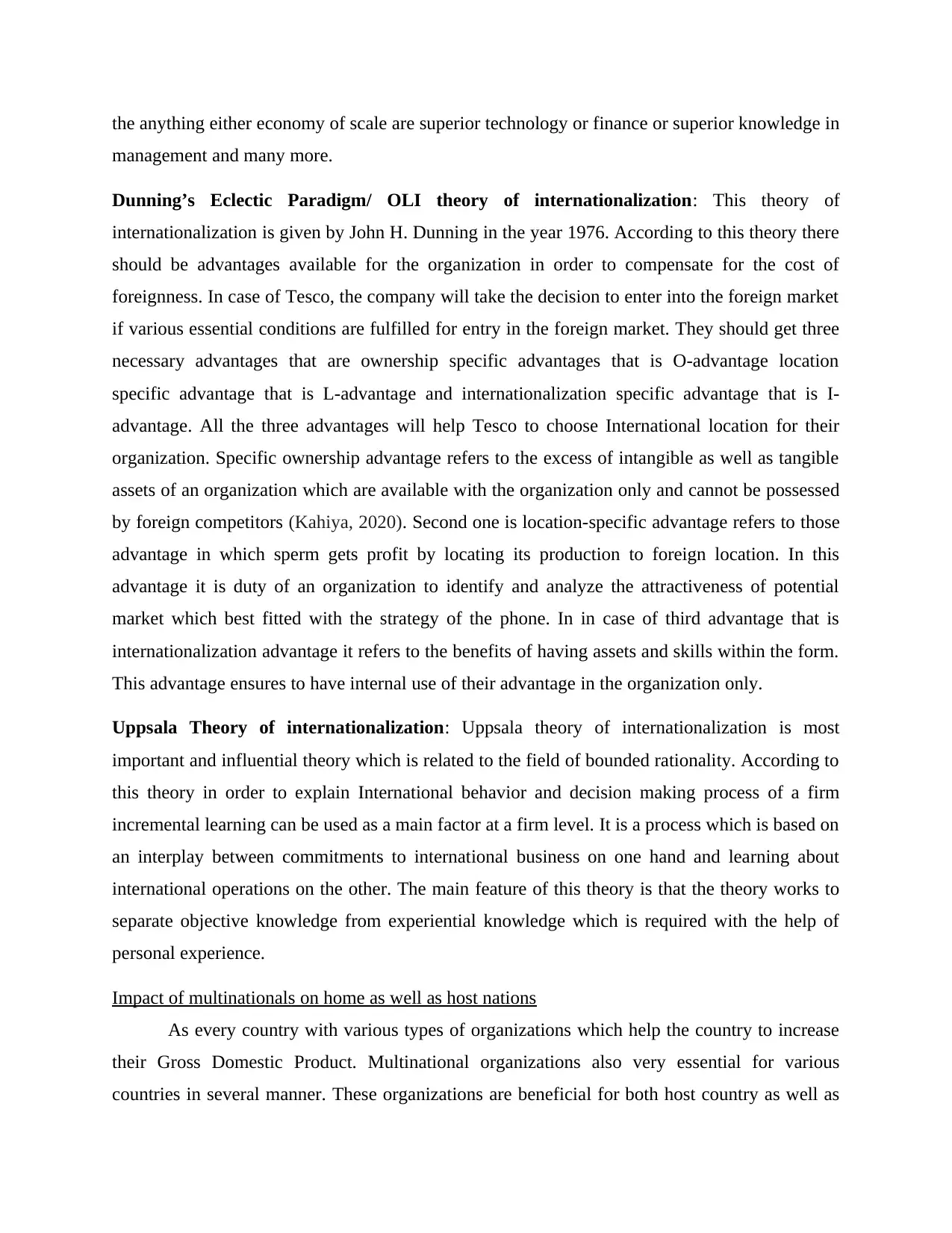
the anything either economy of scale are superior technology or finance or superior knowledge in
management and many more.
Dunning’s Eclectic Paradigm/ OLI theory of internationalization: This theory of
internationalization is given by John H. Dunning in the year 1976. According to this theory there
should be advantages available for the organization in order to compensate for the cost of
foreignness. In case of Tesco, the company will take the decision to enter into the foreign market
if various essential conditions are fulfilled for entry in the foreign market. They should get three
necessary advantages that are ownership specific advantages that is O-advantage location
specific advantage that is L-advantage and internationalization specific advantage that is I-
advantage. All the three advantages will help Tesco to choose International location for their
organization. Specific ownership advantage refers to the excess of intangible as well as tangible
assets of an organization which are available with the organization only and cannot be possessed
by foreign competitors (Kahiya, 2020). Second one is location-specific advantage refers to those
advantage in which sperm gets profit by locating its production to foreign location. In this
advantage it is duty of an organization to identify and analyze the attractiveness of potential
market which best fitted with the strategy of the phone. In in case of third advantage that is
internationalization advantage it refers to the benefits of having assets and skills within the form.
This advantage ensures to have internal use of their advantage in the organization only.
Uppsala Theory of internationalization: Uppsala theory of internationalization is most
important and influential theory which is related to the field of bounded rationality. According to
this theory in order to explain International behavior and decision making process of a firm
incremental learning can be used as a main factor at a firm level. It is a process which is based on
an interplay between commitments to international business on one hand and learning about
international operations on the other. The main feature of this theory is that the theory works to
separate objective knowledge from experiential knowledge which is required with the help of
personal experience.
Impact of multinationals on home as well as host nations
As every country with various types of organizations which help the country to increase
their Gross Domestic Product. Multinational organizations also very essential for various
countries in several manner. These organizations are beneficial for both host country as well as
management and many more.
Dunning’s Eclectic Paradigm/ OLI theory of internationalization: This theory of
internationalization is given by John H. Dunning in the year 1976. According to this theory there
should be advantages available for the organization in order to compensate for the cost of
foreignness. In case of Tesco, the company will take the decision to enter into the foreign market
if various essential conditions are fulfilled for entry in the foreign market. They should get three
necessary advantages that are ownership specific advantages that is O-advantage location
specific advantage that is L-advantage and internationalization specific advantage that is I-
advantage. All the three advantages will help Tesco to choose International location for their
organization. Specific ownership advantage refers to the excess of intangible as well as tangible
assets of an organization which are available with the organization only and cannot be possessed
by foreign competitors (Kahiya, 2020). Second one is location-specific advantage refers to those
advantage in which sperm gets profit by locating its production to foreign location. In this
advantage it is duty of an organization to identify and analyze the attractiveness of potential
market which best fitted with the strategy of the phone. In in case of third advantage that is
internationalization advantage it refers to the benefits of having assets and skills within the form.
This advantage ensures to have internal use of their advantage in the organization only.
Uppsala Theory of internationalization: Uppsala theory of internationalization is most
important and influential theory which is related to the field of bounded rationality. According to
this theory in order to explain International behavior and decision making process of a firm
incremental learning can be used as a main factor at a firm level. It is a process which is based on
an interplay between commitments to international business on one hand and learning about
international operations on the other. The main feature of this theory is that the theory works to
separate objective knowledge from experiential knowledge which is required with the help of
personal experience.
Impact of multinationals on home as well as host nations
As every country with various types of organizations which help the country to increase
their Gross Domestic Product. Multinational organizations also very essential for various
countries in several manner. These organizations are beneficial for both host country as well as
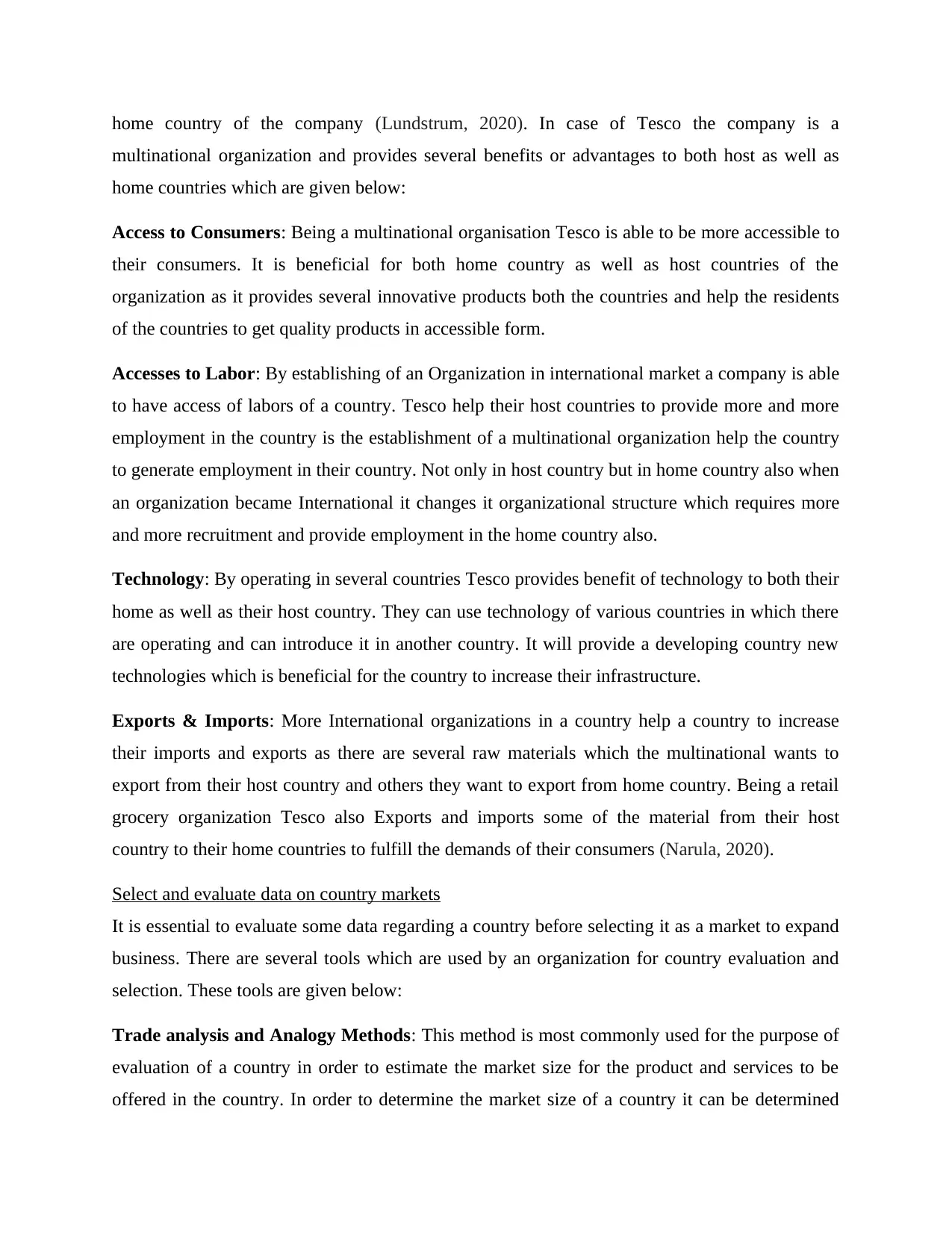
home country of the company (Lundstrum, 2020). In case of Tesco the company is a
multinational organization and provides several benefits or advantages to both host as well as
home countries which are given below:
Access to Consumers: Being a multinational organisation Tesco is able to be more accessible to
their consumers. It is beneficial for both home country as well as host countries of the
organization as it provides several innovative products both the countries and help the residents
of the countries to get quality products in accessible form.
Accesses to Labor: By establishing of an Organization in international market a company is able
to have access of labors of a country. Tesco help their host countries to provide more and more
employment in the country is the establishment of a multinational organization help the country
to generate employment in their country. Not only in host country but in home country also when
an organization became International it changes it organizational structure which requires more
and more recruitment and provide employment in the home country also.
Technology: By operating in several countries Tesco provides benefit of technology to both their
home as well as their host country. They can use technology of various countries in which there
are operating and can introduce it in another country. It will provide a developing country new
technologies which is beneficial for the country to increase their infrastructure.
Exports & Imports: More International organizations in a country help a country to increase
their imports and exports as there are several raw materials which the multinational wants to
export from their host country and others they want to export from home country. Being a retail
grocery organization Tesco also Exports and imports some of the material from their host
country to their home countries to fulfill the demands of their consumers (Narula, 2020).
Select and evaluate data on country markets
It is essential to evaluate some data regarding a country before selecting it as a market to expand
business. There are several tools which are used by an organization for country evaluation and
selection. These tools are given below:
Trade analysis and Analogy Methods: This method is most commonly used for the purpose of
evaluation of a country in order to estimate the market size for the product and services to be
offered in the country. In order to determine the market size of a country it can be determined
multinational organization and provides several benefits or advantages to both host as well as
home countries which are given below:
Access to Consumers: Being a multinational organisation Tesco is able to be more accessible to
their consumers. It is beneficial for both home country as well as host countries of the
organization as it provides several innovative products both the countries and help the residents
of the countries to get quality products in accessible form.
Accesses to Labor: By establishing of an Organization in international market a company is able
to have access of labors of a country. Tesco help their host countries to provide more and more
employment in the country is the establishment of a multinational organization help the country
to generate employment in their country. Not only in host country but in home country also when
an organization became International it changes it organizational structure which requires more
and more recruitment and provide employment in the home country also.
Technology: By operating in several countries Tesco provides benefit of technology to both their
home as well as their host country. They can use technology of various countries in which there
are operating and can introduce it in another country. It will provide a developing country new
technologies which is beneficial for the country to increase their infrastructure.
Exports & Imports: More International organizations in a country help a country to increase
their imports and exports as there are several raw materials which the multinational wants to
export from their host country and others they want to export from home country. Being a retail
grocery organization Tesco also Exports and imports some of the material from their host
country to their home countries to fulfill the demands of their consumers (Narula, 2020).
Select and evaluate data on country markets
It is essential to evaluate some data regarding a country before selecting it as a market to expand
business. There are several tools which are used by an organization for country evaluation and
selection. These tools are given below:
Trade analysis and Analogy Methods: This method is most commonly used for the purpose of
evaluation of a country in order to estimate the market size for the product and services to be
offered in the country. In order to determine the market size of a country it can be determined
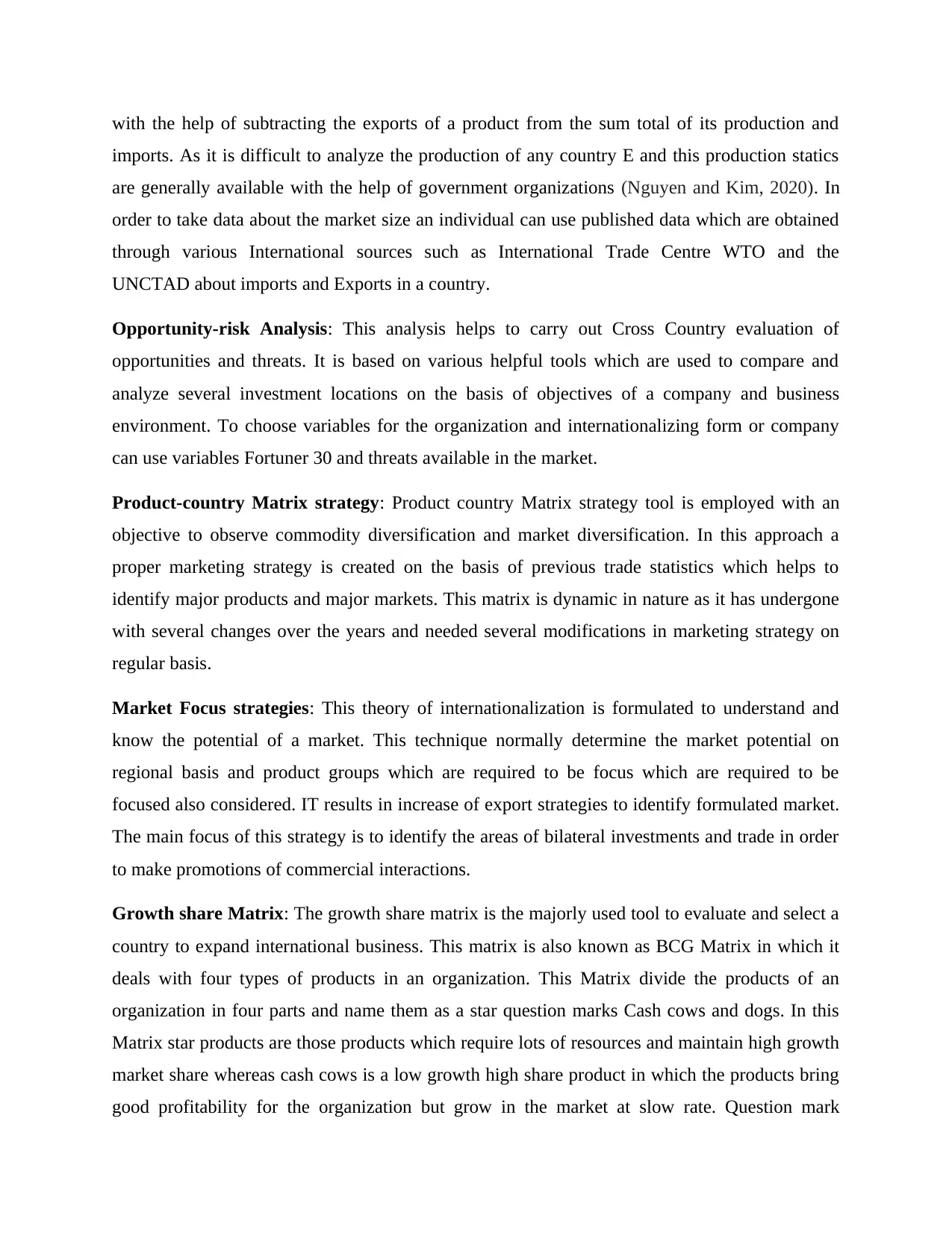
with the help of subtracting the exports of a product from the sum total of its production and
imports. As it is difficult to analyze the production of any country E and this production statics
are generally available with the help of government organizations (Nguyen and Kim, 2020). In
order to take data about the market size an individual can use published data which are obtained
through various International sources such as International Trade Centre WTO and the
UNCTAD about imports and Exports in a country.
Opportunity-risk Analysis: This analysis helps to carry out Cross Country evaluation of
opportunities and threats. It is based on various helpful tools which are used to compare and
analyze several investment locations on the basis of objectives of a company and business
environment. To choose variables for the organization and internationalizing form or company
can use variables Fortuner 30 and threats available in the market.
Product-country Matrix strategy: Product country Matrix strategy tool is employed with an
objective to observe commodity diversification and market diversification. In this approach a
proper marketing strategy is created on the basis of previous trade statistics which helps to
identify major products and major markets. This matrix is dynamic in nature as it has undergone
with several changes over the years and needed several modifications in marketing strategy on
regular basis.
Market Focus strategies: This theory of internationalization is formulated to understand and
know the potential of a market. This technique normally determine the market potential on
regional basis and product groups which are required to be focus which are required to be
focused also considered. IT results in increase of export strategies to identify formulated market.
The main focus of this strategy is to identify the areas of bilateral investments and trade in order
to make promotions of commercial interactions.
Growth share Matrix: The growth share matrix is the majorly used tool to evaluate and select a
country to expand international business. This matrix is also known as BCG Matrix in which it
deals with four types of products in an organization. This Matrix divide the products of an
organization in four parts and name them as a star question marks Cash cows and dogs. In this
Matrix star products are those products which require lots of resources and maintain high growth
market share whereas cash cows is a low growth high share product in which the products bring
good profitability for the organization but grow in the market at slow rate. Question mark
imports. As it is difficult to analyze the production of any country E and this production statics
are generally available with the help of government organizations (Nguyen and Kim, 2020). In
order to take data about the market size an individual can use published data which are obtained
through various International sources such as International Trade Centre WTO and the
UNCTAD about imports and Exports in a country.
Opportunity-risk Analysis: This analysis helps to carry out Cross Country evaluation of
opportunities and threats. It is based on various helpful tools which are used to compare and
analyze several investment locations on the basis of objectives of a company and business
environment. To choose variables for the organization and internationalizing form or company
can use variables Fortuner 30 and threats available in the market.
Product-country Matrix strategy: Product country Matrix strategy tool is employed with an
objective to observe commodity diversification and market diversification. In this approach a
proper marketing strategy is created on the basis of previous trade statistics which helps to
identify major products and major markets. This matrix is dynamic in nature as it has undergone
with several changes over the years and needed several modifications in marketing strategy on
regular basis.
Market Focus strategies: This theory of internationalization is formulated to understand and
know the potential of a market. This technique normally determine the market potential on
regional basis and product groups which are required to be focus which are required to be
focused also considered. IT results in increase of export strategies to identify formulated market.
The main focus of this strategy is to identify the areas of bilateral investments and trade in order
to make promotions of commercial interactions.
Growth share Matrix: The growth share matrix is the majorly used tool to evaluate and select a
country to expand international business. This matrix is also known as BCG Matrix in which it
deals with four types of products in an organization. This Matrix divide the products of an
organization in four parts and name them as a star question marks Cash cows and dogs. In this
Matrix star products are those products which require lots of resources and maintain high growth
market share whereas cash cows is a low growth high share product in which the products bring
good profitability for the organization but grow in the market at slow rate. Question mark
Secure Best Marks with AI Grader
Need help grading? Try our AI Grader for instant feedback on your assignments.
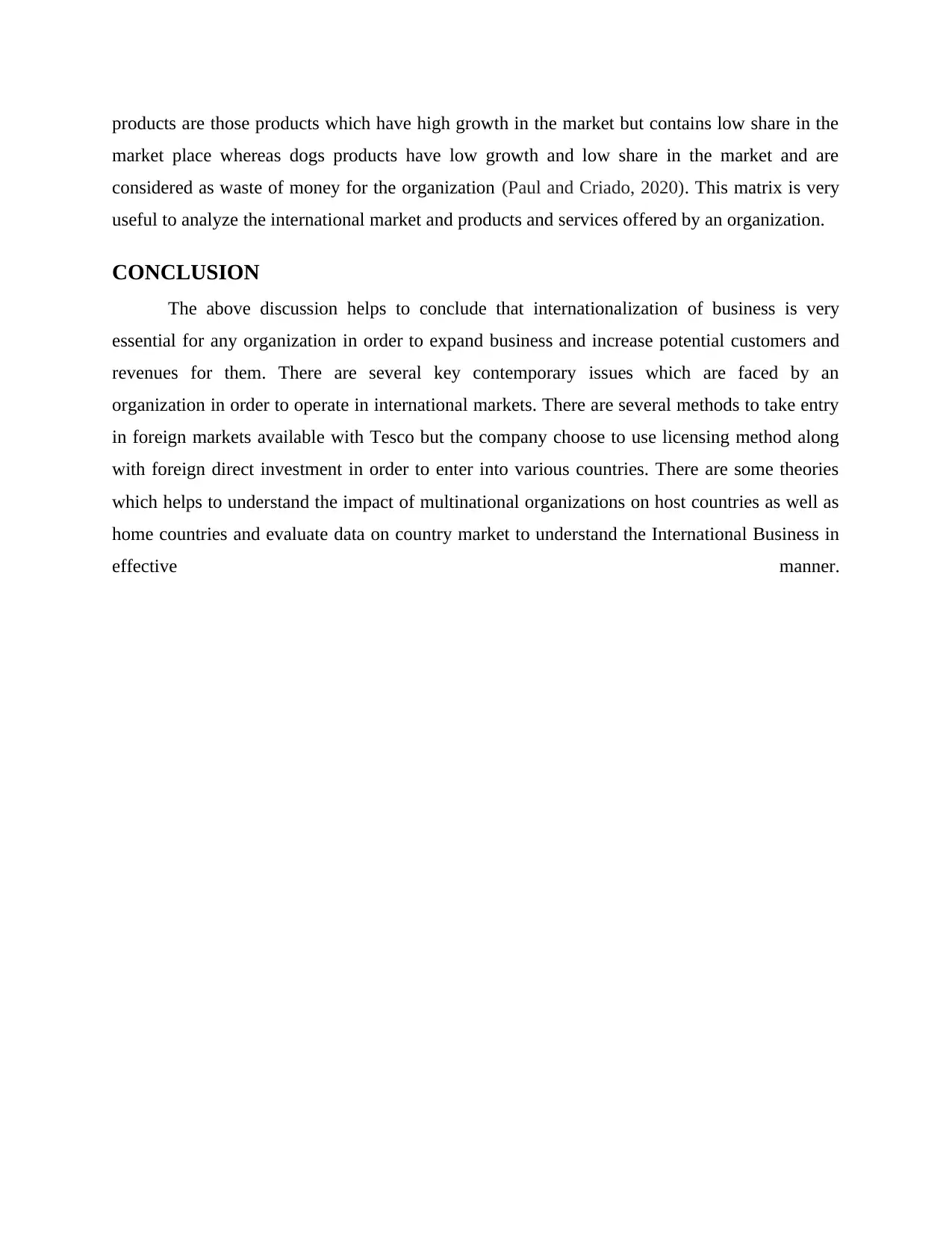
products are those products which have high growth in the market but contains low share in the
market place whereas dogs products have low growth and low share in the market and are
considered as waste of money for the organization (Paul and Criado, 2020). This matrix is very
useful to analyze the international market and products and services offered by an organization.
CONCLUSION
The above discussion helps to conclude that internationalization of business is very
essential for any organization in order to expand business and increase potential customers and
revenues for them. There are several key contemporary issues which are faced by an
organization in order to operate in international markets. There are several methods to take entry
in foreign markets available with Tesco but the company choose to use licensing method along
with foreign direct investment in order to enter into various countries. There are some theories
which helps to understand the impact of multinational organizations on host countries as well as
home countries and evaluate data on country market to understand the International Business in
effective manner.
market place whereas dogs products have low growth and low share in the market and are
considered as waste of money for the organization (Paul and Criado, 2020). This matrix is very
useful to analyze the international market and products and services offered by an organization.
CONCLUSION
The above discussion helps to conclude that internationalization of business is very
essential for any organization in order to expand business and increase potential customers and
revenues for them. There are several key contemporary issues which are faced by an
organization in order to operate in international markets. There are several methods to take entry
in foreign markets available with Tesco but the company choose to use licensing method along
with foreign direct investment in order to enter into various countries. There are some theories
which helps to understand the impact of multinational organizations on host countries as well as
home countries and evaluate data on country market to understand the International Business in
effective manner.
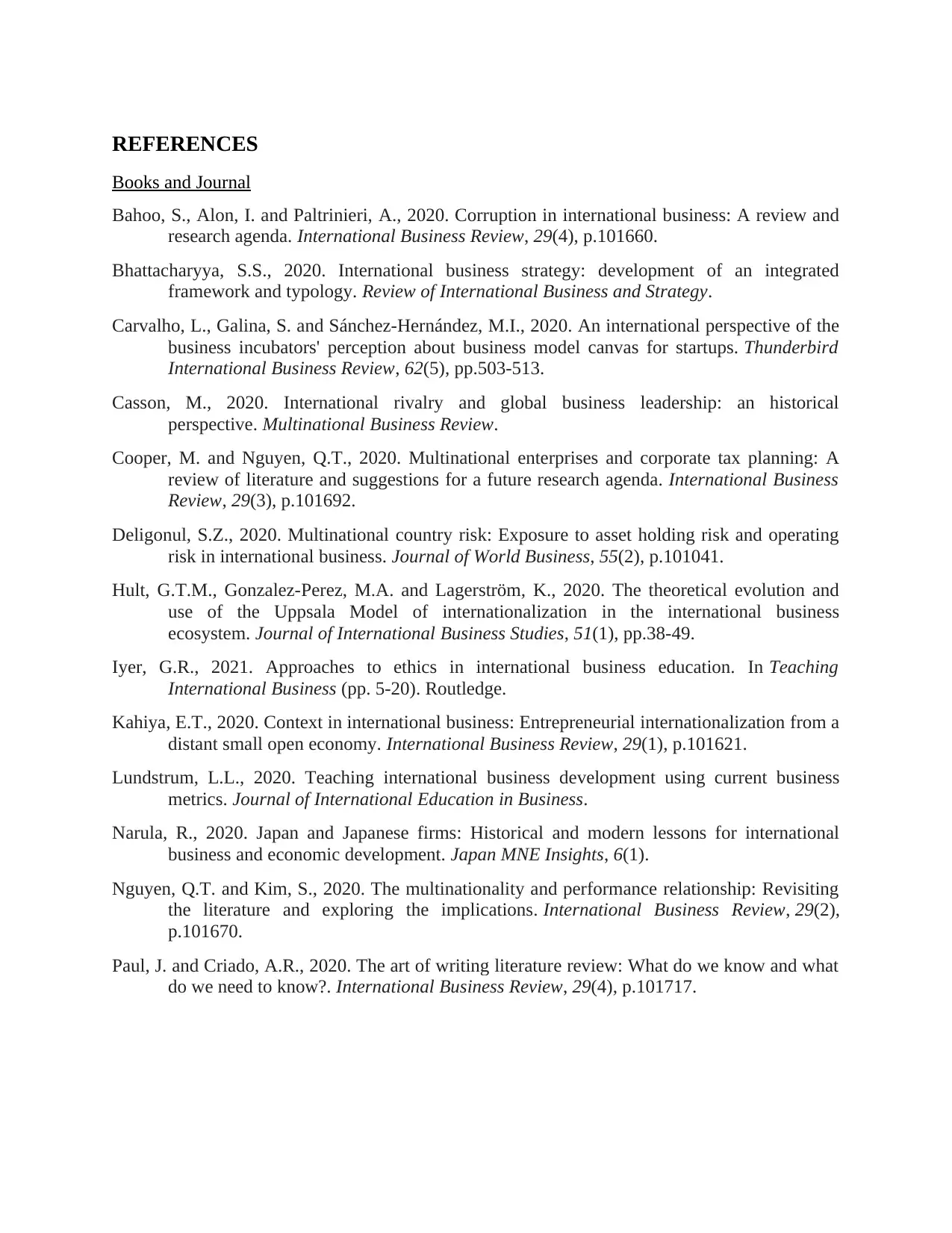
REFERENCES
Books and Journal
Bahoo, S., Alon, I. and Paltrinieri, A., 2020. Corruption in international business: A review and
research agenda. International Business Review, 29(4), p.101660.
Bhattacharyya, S.S., 2020. International business strategy: development of an integrated
framework and typology. Review of International Business and Strategy.
Carvalho, L., Galina, S. and Sánchez‐Hernández, M.I., 2020. An international perspective of the
business incubators' perception about business model canvas for startups. Thunderbird
International Business Review, 62(5), pp.503-513.
Casson, M., 2020. International rivalry and global business leadership: an historical
perspective. Multinational Business Review.
Cooper, M. and Nguyen, Q.T., 2020. Multinational enterprises and corporate tax planning: A
review of literature and suggestions for a future research agenda. International Business
Review, 29(3), p.101692.
Deligonul, S.Z., 2020. Multinational country risk: Exposure to asset holding risk and operating
risk in international business. Journal of World Business, 55(2), p.101041.
Hult, G.T.M., Gonzalez-Perez, M.A. and Lagerström, K., 2020. The theoretical evolution and
use of the Uppsala Model of internationalization in the international business
ecosystem. Journal of International Business Studies, 51(1), pp.38-49.
Iyer, G.R., 2021. Approaches to ethics in international business education. In Teaching
International Business (pp. 5-20). Routledge.
Kahiya, E.T., 2020. Context in international business: Entrepreneurial internationalization from a
distant small open economy. International Business Review, 29(1), p.101621.
Lundstrum, L.L., 2020. Teaching international business development using current business
metrics. Journal of International Education in Business.
Narula, R., 2020. Japan and Japanese firms: Historical and modern lessons for international
business and economic development. Japan MNE Insights, 6(1).
Nguyen, Q.T. and Kim, S., 2020. The multinationality and performance relationship: Revisiting
the literature and exploring the implications. International Business Review, 29(2),
p.101670.
Paul, J. and Criado, A.R., 2020. The art of writing literature review: What do we know and what
do we need to know?. International Business Review, 29(4), p.101717.
Books and Journal
Bahoo, S., Alon, I. and Paltrinieri, A., 2020. Corruption in international business: A review and
research agenda. International Business Review, 29(4), p.101660.
Bhattacharyya, S.S., 2020. International business strategy: development of an integrated
framework and typology. Review of International Business and Strategy.
Carvalho, L., Galina, S. and Sánchez‐Hernández, M.I., 2020. An international perspective of the
business incubators' perception about business model canvas for startups. Thunderbird
International Business Review, 62(5), pp.503-513.
Casson, M., 2020. International rivalry and global business leadership: an historical
perspective. Multinational Business Review.
Cooper, M. and Nguyen, Q.T., 2020. Multinational enterprises and corporate tax planning: A
review of literature and suggestions for a future research agenda. International Business
Review, 29(3), p.101692.
Deligonul, S.Z., 2020. Multinational country risk: Exposure to asset holding risk and operating
risk in international business. Journal of World Business, 55(2), p.101041.
Hult, G.T.M., Gonzalez-Perez, M.A. and Lagerström, K., 2020. The theoretical evolution and
use of the Uppsala Model of internationalization in the international business
ecosystem. Journal of International Business Studies, 51(1), pp.38-49.
Iyer, G.R., 2021. Approaches to ethics in international business education. In Teaching
International Business (pp. 5-20). Routledge.
Kahiya, E.T., 2020. Context in international business: Entrepreneurial internationalization from a
distant small open economy. International Business Review, 29(1), p.101621.
Lundstrum, L.L., 2020. Teaching international business development using current business
metrics. Journal of International Education in Business.
Narula, R., 2020. Japan and Japanese firms: Historical and modern lessons for international
business and economic development. Japan MNE Insights, 6(1).
Nguyen, Q.T. and Kim, S., 2020. The multinationality and performance relationship: Revisiting
the literature and exploring the implications. International Business Review, 29(2),
p.101670.
Paul, J. and Criado, A.R., 2020. The art of writing literature review: What do we know and what
do we need to know?. International Business Review, 29(4), p.101717.
1 out of 12
Related Documents
Your All-in-One AI-Powered Toolkit for Academic Success.
+13062052269
info@desklib.com
Available 24*7 on WhatsApp / Email
![[object Object]](/_next/static/media/star-bottom.7253800d.svg)
Unlock your academic potential
© 2024 | Zucol Services PVT LTD | All rights reserved.




